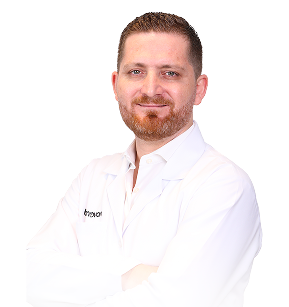Dr. Yamen Al Ahmad is a distinguished consultant urologist with extensive expertise in diagnosing and treating a wide range of urological and andrological disorders. With years of specialized training and clinical experience, he has built a reputation for excellence in both surgical and non-surgical management of urological conditions.
After earning his medical degree, Dr. Yamen pursued advanced training in urology, equipping himself with the latest knowledge and techniques in minimally invasive procedures, laparoscopic surgeries, and male reproductive health. His dedication to improving patient care has led him to work in leading medical institutions, where he has performed complex surgeries and provided innovative treatments tailored to each patient’s needs.
Areas of Expertise
Dr. Yamen specializes in various aspects of urology and andrology, including but not limited to:
- Endourology & Laparoscopic Urological Surgery – Expert in performing minimally invasive procedures for kidney stones, ureteral strictures, and bladder disorders using state-of-the-art techniques.
- Kidney Stones & Prostate Disease Management – Provides comprehensive care for kidney stone prevention and removal, as well as advanced treatments for benign prostatic hyperplasia (BPH) and prostate cancer.
- Male Infertility & Erectile Dysfunction – Specializes in diagnosing and treating conditions related to male reproductive health, including low testosterone, Peyronie’s disease, varicocele repair, and sperm retrieval techniques (Micro TESE).
- Urinary Tract Infections & Incontinence Treatment – Offers effective treatment plans for recurrent urinary tract infections (UTIs), overactive bladder, and stress urinary incontinence.
- Urological Oncology & Reconstructive Urology – Proficient in the management of urological cancers (kidney, bladder, prostate, and testicular cancer) and reconstructive procedures for congenital or acquired urological conditions.
Research & Publications
Dr. Yamen is actively involved in medical research, contributing valuable insights to the field of urology and andrology. His research focuses on improving surgical outcomes, enhancing fertility treatments, and advancing minimally invasive techniques in urology. He has published numerous scientific articles in peer-reviewed journals, shedding light on innovative treatment approaches for kidney stones, erectile dysfunction, and male infertility.
Additionally, he has presented his findings at national and international conferences, where he has engaged in discussions with fellow experts to advance medical knowledge in urology. His commitment to academic excellence and research ensures that he remains at the forefront of modern urological advancements, continuously integrating the latest evidence-based treatments into his clinical practice.
Commitment to Excellence
Dr. Yamen’s patient-centered approach ensures that each individual receives personalized care tailored to their specific condition. His passion for urology and andrology extends beyond clinical practice, as he actively participates in professional associations and organizations dedicated to improving urological healthcare worldwide.
Through his continuous pursuit of knowledge and dedication to high-quality patient care, Dr. Yamen remains a trusted expert in the field of urology, offering world-class treatment to patients seeking advanced medical solutions for their urological and reproductive health concerns.
Book an appointment with Dr. Yamen Al Ahmad today for expert consultation and personalized treatment plans designed to improve your quality of life.


